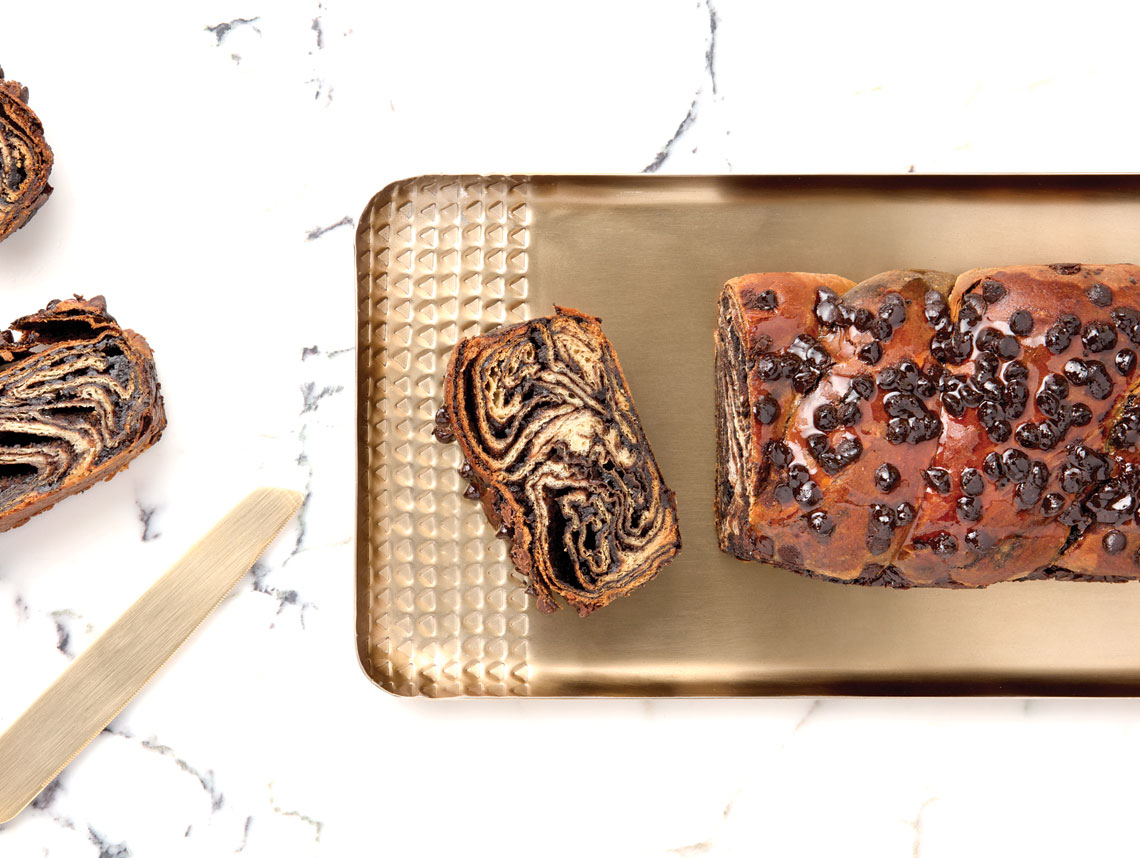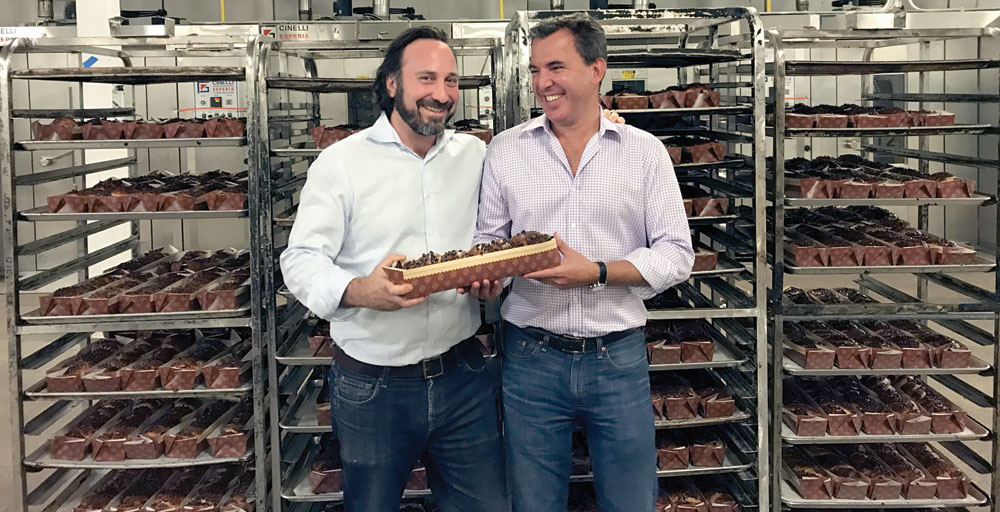 Supreme chocolate babka from Lilly’s Baking Co. Photo by Scott Gordon Bleicher
Supreme chocolate babka from Lilly’s Baking Co. Photo by Scott Gordon Bleicher On the corner of 62nd Street and Ninth Avenue in southwest Brooklyn, just a stone’s throw from Sandy Koufax’s childhood stomping grounds, an irrepressible scent of chocolate swirls in the air.
It’s coming from Brooklyn Brands, an old-school-meets-new-school bakery that turns out Ashkenazi Jewish classics such as babka, marble cake, hamantashen, rugelach and some of the best black-and-white cookies New York City has to offer.
Each day, some 250 people clock in at the bustling, multiroom commercial bakery, whose products have spread across the country, including to Los Angeles. In one room, a team of workers decorates the black-and-whites by hand, dipping spatulas into oversized saucepans of icing and smoothing them over each cookie’s surface. Nearby, other staffers braid fat ropes of yeasted challah dough into loaves, and chocolate-filled strands of babka are coiled and tucked into baking pans.
Brooklyn Brands was founded in 2015, but its history stretches back to the early 1940s, when Renee Schick opened a small, kosher challah and pastry business that grew into the locally beloved Schick’s Gourmet Bakery. Today, Schick’s is one of five Brooklyn-based kosher bakeries housed under the Brooklyn Brands line. The others include Lilly’s Baking Company, Mezonos Maven, Smilowitz Bakery and Mehadrin.
Co-directors Seth Zalkin and Mickey Klein, longtime friends and business partners, believe in the power of numbers. So when they acquired the bakeries, which had been consolidated by the previous owner, they began to imagine what it would look like for a slice of Brooklyn’s Jewish culinary heritage to reach across the country, even the globe.
“We saw a brand that was undermarketed and underdeveloped, but the quality of baked goods being produced was consistently high,” Klein said. “We grew up with these products and realized they could have wider appeal.”
“These companies were selling primarily to local yeshivas and kosher groceries,” Zalkin added. “We wanted them to be in places like Whole Foods, Stop & Shop, Publix, Costco and Kroger.”
Today, the company’s products are sold in more than 10,000 supermarkets across the United States and online. Customers in far-flung locales, from Louisiana to California, who almost certainly would not have stumbled across authentic Brooklyn babka or rugelach in their supermarkets, are smitten with these Jewish sweets. In Los Angeles, Whole Foods sells them under the Lilly’s or Schick’s brand, and they long ago started appearing around the Southland at other gourmet retailers.
One customer’s recent Amazon review of Lilly’s cinnamon babka is particularly representative: “On a lark I ordered ‘babka’ because I had heard about it on Seinfeld. It is delicious!”
“We thank Seinfeld every day,” said Klein, referring to the episode in which Jerry and Elaine attempt to order the pastry at a Manhattan bakery.
Zalkin and Klein are smitten too. Maybe it’s the draw of being part of such a vibrant baking community, or maybe it’s just the siren call of yeast, jam and chocolate. But while they remain active partners at their global advisory firm, Astor Group, Klein said he and Zalkin now spend 99 percent of their time at Brooklyn Brands.
Klein, who immigrated to New York from the Soviet Union as a child, is fluent in Hebrew and Yiddish. The latter language goes an especially long way when working with traditional kosher bakeries and Chasidic clients in Brooklyn. Zalkin, meanwhile, has an impressive if unusual familial connection to kosher baking. His grandmother, Hattie Zalkin, helped persuade the Girl Scouts to remove lard from their cookie recipes and get kosher certification.
Under Brooklyn Brands, the five bakeries continue to function primarily as they always have, without much top-down disruption, although they are now all under the same roof instead of in separate locations. All of the baked goods are currently pareve (the company plans to add a dairy line in 2018) and maintain a homey, Jewish quality.
Products from Mezonos Maven, Smilowitz, and Mehadrin are sold primarily in New York, New Jersey and Connecticut, while Lilly’s and, to some extent, Schick’s, are scaling up and beyond.
To that end, a few significant changes have been made. The first is ensuring that the Brooklyn Brands’ products, many of which have been made with the same recipes for decades, remain high quality. “Our feeling was, if we can’t make a product we are proud of, let’s not do it anymore,” Zalkin said.

Today, the products’ ingredient lists are noticeably more wholesome than those on most commercially produced baked goods — think unbleached flour, cocoa powder, and orange juice rather than hydrogenated cottonseed oil and artificial flavorings. The team recently developed a rainbow cookie colored with food dyes made from pigment-rich plants rather than from chemicals — red from beets, yellow from turmeric, and green from alfalfa. The goal is to be completely free of genetically modified organisms (GMOs) by next year.
“We’re making stuff that my wife and I feel OK feeding to our kids,” Zalkin said.
Of course, babka and marble cake aren’t exactly health foods. But for those looking for “intentional indulgences,” as Klein called them, his bakeries provide a better option.
The second big change is packaging, which up until recently had a decidedly old-fashioned and ad hoc look. “There was not a lot of branding consistency. The products were called by different names in different places,” Zalkin said.
They worked with a design team to create modern logos and boxes that would appeal to a wider audience while staying recognizable to longtime customers. The packages also tout the pastries’ various health claims, such as vegan or gluten-free.
Brooklyn Brands is in the final stages of opening a second baking facility in the South Bronx that Zalkin described as “bigger, fancier and more fun.” The expansion will allow scaled-up production to meet growing demand, but Zalkin said the hand-crafted approach to baking will remain.
When it comes to growth, the team is open to expanding the product line, so long as new baked goods capture the same spirit of Old World, ethnic Brooklyn baking. So, Italian almond horn cookies? Perhaps. Croissants? Probably not.
Most important, Zalkin said, they want Brooklyn Brands’ baked goods to continue reaching new corners of the country and world. They would love to see hamantashen and macaroons served at church picnics and at family reunions as well as on synagogue Kiddush tables. Their honey cakes already are a year-round staple, although production spikes during the High Holy Days.
The two entrepreneurs envision single-serve packages of their black-and-whites and other cookies in places like 7-Eleven and at Starbucks.
“There is no reason our products should not be mainstream American brands,” Zalkin said. “We are not just an Orthodox Jewish bakery. We are a fantastic bakery.”
Leah Koenig is the author of “Little Book of Jewish Appetizers” and “Modern Jewish Cooking.”






















 More news and opinions than at a Shabbat dinner, right in your inbox.
More news and opinions than at a Shabbat dinner, right in your inbox.